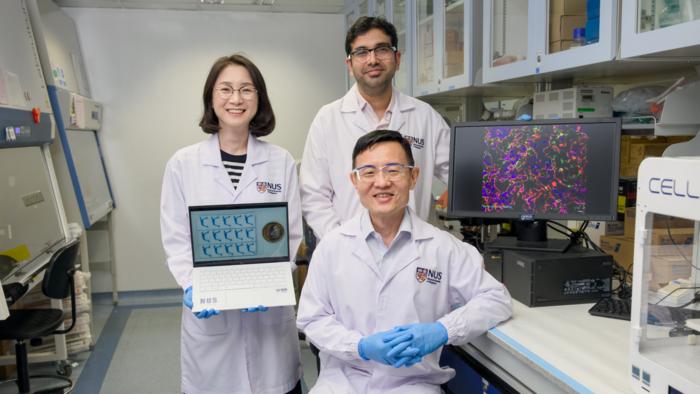In a groundbreaking achievement in gut health research, scientists from the National University of Singapore (NUS) have unveiled an innovative 3D microchip model known as the Gut-Microbiome on a Chip (GMoC). This groundbreaking device is approximately half the size of a five-cent coin and serves as a sophisticated cell-culturing platform, allowing researchers to investigate the intricate interactions between gut microbes and human health. As obesity and gastrointestinal disorders continue to rise globally, understanding these interactions becomes essential.
The GMoC not only replicates the complex environment of the human gut but also offers a scalable and reproducible means to examine the microbial community within. By utilizing this technology, scientists are better equipped to assess the impact of various gut microorganisms on overall health, thus fundamentally transforming the field of gut microbiome research. Professor Lim Chwee Teck, leading the research team, stated, “The GMoC system signifies a paradigm shift in our quest to decode the gut microbiome’s role in health and disease.” This model enables detailed exploration of the physiological roles of diverse microbial communities, propelling advancements in preventive healthcare and pharmaceuticals.
Historically, the relationship between gut microbiota and human health has been difficult to decipher, largely due to the complex interplay among trillions of microbes residing in the intestines. With microorganisms capable of affecting everything from digestion to immune response, their specific mechanisms often remain elusive. The GMoC effectively mimics these biological interactions, providing a more accurate representation of real-world conditions compared to previous static models.
The 3D design is particularly advantageous as it introduces vital elements such as oxygen gradients and food movement simulation, which are essential for microbial growth and function that are ideally present within a living gastrointestinal tract. This simulated environment allows researchers to cultivate microbial communities more accurately, facilitating better understanding of the nuances of microbial interactions and their potential impacts on gut health.
A defining characteristic of the GMoC is its integration of structural features representative of the human gut. The model includes 3D versions of intestinal villi, which are critical for nutrient absorption. By replicating these tiny, finger-like projections, scientists can explore how microbial positioning affects their functionality. Such insights are crucial, especially considering that the precise localization of microbes can influence their metabolic activities and interactions, shedding light on their contributions to health or disease.
Furthermore, the GMoC system establishes a physiologically relevant gut model, capable of producing mucin – a substance essential for protecting the intestinal lining from microbial invasion. By mirroring the gut’s natural defense mechanisms, the system enables better exploration of microbial behavior, highlighting how specific bacteria can either contribute to health or exacerbate conditions.
The platform’s ability to facilitate real-time observations of microbial interactions stands out as one of its most significant advantages. Researchers anticipate that the GMoC will be instrumental in unraveling the competitive dynamics occurring among gut bacteria. The competition for nutrients and space is a critical aspect of maintaining gut health and preventing pathogenic bacteria from establishing dominance, which can lead to various gastrointestinal disorders.
In addition to its immediate research implications, the GMoC opens avenues for future exploration in areas such as antibiotic effects on microbiomes and the impact of dietary changes on gut health. By understanding how different environmental stimuli affect microbial communities, researchers can develop targeted interventions aimed at modulating gut microbiota to foster better health outcomes.
The vision for the GMoC extends to incorporating even more complexities, with plans to include mechanical cues that mirror real-life gut conditions, alongside enhancing the cellular diversity within the model. This continuous refinement holds promise for creating a truly unparalleled platform for microbiome research.
The research is not just an isolated achievement; it catalyzes a broader awakening within the scientific community about the vital role of gut microorganisms in human health. By creating a more relevant and dynamic model, the GMoC is on track to contribute significantly towards uncovering new therapeutic approaches that harness the microbiome’s power for disease prevention and treatment.
With this innovative tool now available, the collective quest for understanding the microbiome can gain momentum. The potential to decipher the intricate relationships governing gut microbiota represents a promising frontier in biomedical and health-related research. The GMoC is set to become an invaluable resource, enabling researchers to illuminate our understanding of health, disease, and the fundamental role of gut microbes.
As the field moves forward, cross-disciplinary collaboration involving microbiologists, pharmacologists, and biomedical engineers will be crucial to fully realize the GMoC’s potential. Encouraging scholarly discourse among these domains will enhance the development of microbiome-centric therapies and interventions, impacting public health on a global scale.
This pioneering advancement heralds a new era for gut health research, where the intricate dance between human physiology and microbial inhabitants can be studied in unprecedented detail. As researchers harness the GMoC to untangle this complexity, they stand poised to unlock solutions that could redefine how we approach health and disease management in the 21st century.
In conclusion, the GMoC exemplifies how cutting-edge technology combined with innovative research methodologies can transform our understanding of health’s most enigmatic aspects. This device holds the promise of not just elucidating the gut microbiome’s role but proactively shaping a healthier future through informed, targeted interventions against gut-associated ailments.
Subject of Research: Cells
Article Title: Dissecting Gut-Microbial Community Interactions using a Gut Microbiome-on-a-Chip
News Publication Date: 27-Feb-2024
Web References: DOI Link
References: Advanced Science
Image Credits: National University of Singapore
Keywords: Microbiology, Gastrointestinal disorders, Gut microbiota, 3D modeling, Drug research, Mechanical systems, Nutritional physiology, Disease prevention.
Tags: advancements in preventive healthcarecell-culturing platform for gut studiesdecoding gut microbiome’s roleexploring interactions of gut microorganismsGut-Microbiome on a Chipimpact of gut microbes on healthinnovative 3D microchip modelmicrobial community assessmentNUS gut microbiome researchobesity and gastrointestinal disordersProfessor Lim Chwee Teck researchtransformative technology in health science





